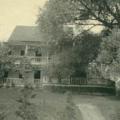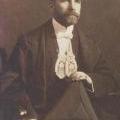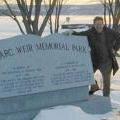O Canada! Our home and native land
True patriot love in all thy sons command.
With glowing hearts we see thee rise
The True North strong and free!
 So begins the national anthem of Canada, or at least the English version of it, sung for generations by Canadians from sea to sea. Many people are unaware that the original poem on which the English version of the anthem is based was written in the Eastern Townships.1 The poet was a man by the name of Robert Stanley Weir (1856-1926).
So begins the national anthem of Canada, or at least the English version of it, sung for generations by Canadians from sea to sea. Many people are unaware that the original poem on which the English version of the anthem is based was written in the Eastern Townships.1 The poet was a man by the name of Robert Stanley Weir (1856-1926).
The Honorable Robert Stanley Weir was a lawyer and ultimately a judge in the Exchequer (today Federal) Court of Canada. Weir had a keen mind and wrote several treatises on the law. He was also an avid golfer, an amateur poet, and a fellow of the Royal Society of Canada. Born in Hamilton, Upper Canada (Ontario) in 1856, Weir moved to Montreal as a young man to study law. He rose quickly in his profession and soon made a name for himself.
SUMMER HOME
As a young lawyer, Weir was drawn to the Eastern Townships. Business connections with Montreal shipping magnate Sir Hugh Allan and well-to-do businessman Alexander Douglas were initially what led Weir to the Eastern Townships, according to Weir's grandson, Steve Simpson, the unofficial custodian of the family history. Both Allan and Douglas had country homes in the Townships, and that is how Weir was introduced to the area, says Simpson. Eventually Weir married Douglas' daughter, Margaret.
According to Simpson, Weir fell in love with "Cedarhurst", a rambling 17-room former hotel in Cedarville, a picturesque hamlet on the east shore of Lake Memphremagog. Weir purchased the property in the early 1880s, and it was there that he and his family would spend their summers, and sometimes as much as six months of the year. It was also there that Weir penned his famous "O Canada".
 JUDGE AND POET
JUDGE AND POET
Judge Weir loved to write poetry in his leisure hours at the lake, and a number of his poems were published in book form. In 1908, the year of the 300th anniversary of Quebec City, Collier's Weekly magazine launched its Canadian edition with a competition. The idea was to come up with an English version of the popular patriotic French Canadian song, "O Canada", written in 1880 by Adolphe-Basile Routhier to music composed by Calixa Lavallée. This song was still relatively unknown in English Canada.
Many people tried their hands at writing an English version to the song. One of those people was Judge Robert Stanley Weir. Weir, who was fluent in both English and French, wrote his version while seated at his piano overlooking Lake Memphremagog in the summer of 1908. As he himself put it, it was his "attempt to secure a much desired Canadian unity."2 And it was Judge Weir's version, over all the others written around that time, that would catch on. In World War I, it is said, Weir's "O Canada" was the patriotic song of choice among Canadians fighting in the trenches of Europe.
ALTERED LYRICS
Weir's "O Canada" contained four verses. The 1908 song was slightly re-worded by the Judge himself around 1921, according to grandson Steve. Weir, Simpson says, recognized that there were "too many 'stand on guards for thee'" in the popular first verse. The version that stuck, however, was the original, and it was verse 1 of this version (in a slightly modified form) that was officially named the national anthem by the Government of Canada in 1980. That year marked the 100th anniversary of the original French "O Canada".
In the English version of the national anthem, two of Weir's "stand on guard" phrases have been replaced with "From far and wide" and "O Canada" respectively, and one of Weir's "O Canadas" has been replaced with "God keep our land". Putting God in there was a question of "political correctness," Simpson claims. "As if the omnipotent power needed the sanction of the Liberal Party!"
 Simpson and other Weir descendants have long opposed changes to the Judge's poetry. A few years ago, an altered version of the song was sung at the Montreal Forum during hockey matches, and gained some popularity. That version inserted the words "for rights and liberty".
Simpson and other Weir descendants have long opposed changes to the Judge's poetry. A few years ago, an altered version of the song was sung at the Montreal Forum during hockey matches, and gained some popularity. That version inserted the words "for rights and liberty".
In 2001, another controversy was touched off when a feminist group, citing gender bias in the national anthem, launched a campaign to substitute the words "in all thy sons command" with the phrase "in all of us command". Polls have shown, however, that Weir's words still touch the hearts of most Canadians, men and women, a fact that would make both Weir and grandson Steve very proud.
Notes:
1) Stanstead Journal, September 18, 1924.
2) Cited by Stephen W. Simpson, in an address to the general meeting of Weir Memorial Park, January 5, 2002. See also: Weir Memorial Park Address by Stephen W. Simpson, May 24, 1999. Both addresses may be found in the Minutes of Weir Memorial Park.